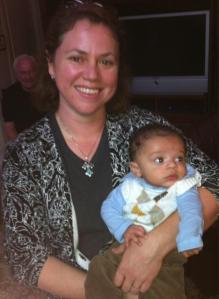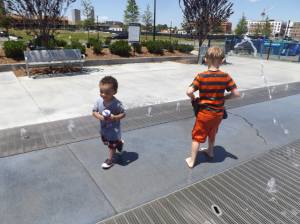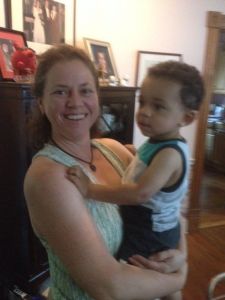I learned about white privilege early. Before it was a thing people talked about, really. I grew up as a white kid in a largely black neighborhood, just across the river from Washington, D.C. I went to elementary school in Alexandria, VA, just a few years after integration was completed. I knew early on, without being able to express it in words, that I was treated differently from my peers of other skin tones. While I learned about the Great American Melting Pot, I saw and felt that it was not entirely true. It didn’t take great skill. I only had to look at the way things shook out at my school. While the demographic makeup of the school was 75% African-American, the gifted and talented program was overwhelmingly white. Out of 30 kids in the program my first year, only 7 were black. And while most of the teachers in the school were black, the teachers for the gifted program were white. I’ve spent a lot of years processing this since then, and I know that I read a lot into it. Maybe my classmates saw things differently. But looking back, I can’t help but feel that systematic injustice and white privilege were already a reality for me, even at age 10.
White privilege is a fact. I know it is an uncomfortable fact, but it is a fact nonetheless. And it’s time to be clear about that. Okay, it’s long (long long long) past time. Every time I see an incidence of white privilege, every time a black friend relates to me a story of having been passed over at the jewelry counter in favor of the white lady behind her, every time a black co-worker tells me he was followed around the store where we worked by the security guard because he was not in his uniform, every time I hear about yet another unarmed black man killed for walking while black, I have thought to myself that we need to speak out, that we need to act. But I have not known how, or I have been afraid to upset my parishioners, or I have felt that now was not the time.
But I can’t keep silent anymore. Because of Liam. Liam was born to Heather, my oldest friend, two years ago. He is of mixed race, but I know that the world will see him as black. The last time I saw Heather and Liam, she asked me a question that has made the news of Michael Brown the tipping point for my (publicly held) silence. If, God forbid, anything should ever happen to her, Heather asked if my husband and I would raise Liam. And without hesitation, I said yes. And then I thought I should probably ask my husband, and he, who is more and more a saint every day, replied, “I’m trying to think of a reason to say no, and I can’t.” And so we are named as Liam’s guardians, if ever the need should arise.
For obvious reasons, I pray hard that this will never, ever happen. But this week, I have been thinking about how, if it did, my husband and I would have to teach Liam how to be a black man. And how utterly ridiculous that sentence is. We have a son of our own. Our 7-year old Holden is already well on the way to becoming an intelligent, thoughtful, kind-hearted, generous man. And that is all I have to teach him. He is a blond-haired, blue-eyed white boy who will be a blond-haired, blue-eyed white man. He will have the advantage of assumed innocence in most circumstances. He will be able to wear his hair any way he chooses, to pick his clothing and his house and his car and his career and even his diction, without those choices being criminalized. If he chooses to take time off from work, people will assume he’s “finding himself.” If he decides not to marry his baby-mama some day, people will think he’s choosing an alternative lifestyle. If he for some reason decides to carry a semi-automatic weapon into Target, people will think he is practicing his 2nd amendment rights. Holden will almost never be automatically suspect. And we will never have to teach him how to be a “white” man. Because “white” is the default setting in our society.
Liam, on the other hand, has to be taught more. Just like Holden, Liam will learn how to be a man. That’s the same
whatever the race. So of course his mother is teaching him how to be an intelligent, thoughtful, kind-hearted, generous man, and we will do the same, if called on. But there is more that Liam has to learn. He has to learn how his choices in hairstyle, clothing, housing, car, career, and diction all affect the way others see him, and could be subject to jail or fines if he chooses the wrong thing. He has to learn that, even if he is supporting and living with his baby-mama, if they aren’t married, he may be seen as a “deadbeat dad” and confirmation of a stereotype. He will find his entrance into college called into question on the basis of quotas, and may have his time off between college and career seen as unemployment and laziness, even if he really is just “finding himself.” If he for some reason decides to carry a weapon, any weapon, even a toy weapon, into Target, or anywhere else, he has a greater chance of be thrown in jail or even shot before any questions are asked. He will almost always be automatically suspect. He will have to learn the posture of “hands up, don’t shoot.” And he will have to learn it early, because black male children are seen as “men” so much younger than white male children. While my biological son Holden will still be considered a child at age 12, his brother Liam will be subject to stop-and-search protocols in most large cities in the country. Liam will have to be taught how to be a man, and how to be a “black” man. And if I ignore it, I do so to his peril.
So I ask you, because I honestly don’t have an answer: how do I do this? How do I teach both of my sons that they are
beloved children of the living God? That God came into the world to live and die for them, and to take away their shame and their fear? That the only identity they have is in the grounding of love? And then, how do I turn around and teach one of them that fear may not rule him as regards his soul, but it sure as hell rules his daily living? How do I teach them both that the only thing that owns them is the love of God and that God loves not only them but each and every person they meet; and then turn around and teach one of them that he will be treated by many people, and most especially by the system that governs his life, as if God does not love him? As if he were not worthy?
This is the truth. And I know that many of us white folks would rather not go into it. We would like to see reconciliation. We would like to see peace and happiness and good community relations. But the thing is, reconciliation is going to require some truth-speaking. If we cannot look at this thing head-on, if we are afraid of the conversation, then it will continue to rule us. In my tradition, we call this sin, and we are called on to repent. And repentance, like reconciliation, requires facing some hard truths.
So let’s face it: we are afraid. We are defensive and ashamed and, God bless us, just plain ignorant. Many of us live in places where we are not confronted by this reality. Or we think we do. Many of my neighbors in Washington, MO, think that this is a St. Louis problem, not a problem for our little town. We look at our own lives and think, I don’t have it so great. What white privilege? And our guilt and shame shut us down, and we refuse to even begin the conversation. So at the risk of sounding like Robin Williams in Good Will Hunting, I want to say this: “It’s not your fault.” It’s not. This is a system that we inherited, because it has roots hundreds of years old. It’s not your fault. And it is not about you specifically. When the issue of race comes up, you don’t have to get defensive and claim that you’re not privileged because you don’t live a charmed life either. It’s not your fault, and it’s not about you. It is so much bigger than you and so much bigger than me. It is a system, a cultural reality, an undercurrent to every aspect of American life. But the truth is, though it is not your fault, this reality affects you, it affects us, no matter where we live. And until we begin to own it, it will own us.
So it’s time to start speaking the truth. It’s time to start owning the reality of white privilege. Because the only thing that should own us is Love.



